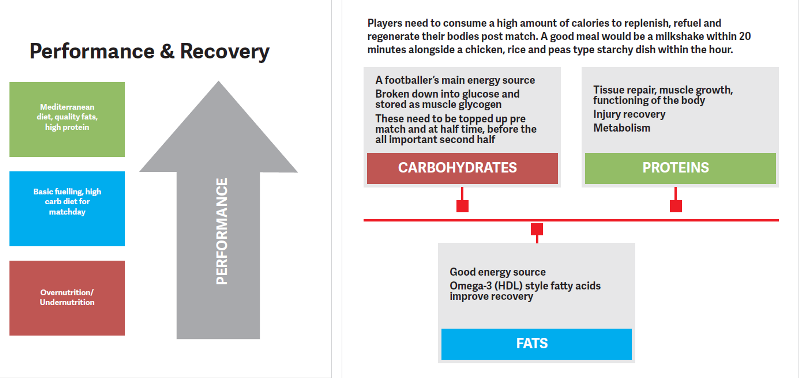Enhancing Performance & Recovery With A Healthy Diet
There have been major advances in sports science and technology to aid the development of players in football, but there is a simple and often over looked element that can have perhaps the biggest impact on a player’s performance and recovery – nutrition. Dietitian and UEFA coach, Matt Lawson explains how simple changes to diet can have a real impact.
How does food play a part in the performance and recovery of players?
Everyone wants to win. Nutrition in football is about helping people do that, making sure the players can perform to give their best for the football club.
After natural talent and training sessions with the coaching staff, the right diet is known to be the next most important element for enhancing performance of male and female players. There is often good work going on already, but we do still sometimes find basic mistakes happening at high profile clubs.
Looking at performance first, how can food impact this?
To win a match we need goals, with most fans enjoying attacking football and particularly a late winner! Most goals are scored in the final 15 minutes of the 90. If we look at the macronutrients that fuel the diet of a footballer first, we find the key to this. Carbohydrates are vital for energy, particularly during high intensity matches with lots of managers now going for possession based football or a high press. If you look at the way clubs like Manchester City and Liverpool play, the players cannot perform to that level without a finely tuned diet.
Glucose from Carbohydrate is the body’s preferred energy source in times of exercise. In sportspeople, insufficient carbohydrate consumption leads to poor exercise performance. Proteins are another essential component of the diet and are required for tissue growth and repair. Fat is the third major food group that is required in the diet. Fats provide a concentrated source of energy for the body. They are also an important component of cells within the body, which is why everyone needs to eat some fat in their diet.
Does a performance enhancing diet need to be tailored to individual players?
Every footballer I have ever worked with has been different in their own way. When talking to the Chef at a club at the training ground recently, we discussed the differing needs of players in 2022. Many different diets are followed by players, vegan, vegetarian, gluten free, diary free, low carb, high fat, time related fasting. Getting this wrong at a hotel pre match meal before a big game could ultimately cost the team the match.
The diet required to meet the needs of a high intensity striker like Mo Salah, covering large distances in a match might well be different than that of a centre back, like Virgil Van Dijk sweeping up and reading the game at the back. If you consider a goalkeeper, we tend to work a lot on concentration and maintaining hydration to the brain as they will usually burn far less calories per match. The modern goalkeeper is usually a part of the attack building phase and so will need to be agile, good with the football and fast off their line.

What signs would show a club dietitian that a player is lacking a specific element of their diet?
We look at the team’s performance on the pitch. Is it at the level expected? If players look sluggish or tired then we might need to see what has been eaten in the 24 hours leading up to the match. For individual players, fatigue can often be down to things like iron-deficiency or a lack of magnesium. If illness is a regular occurrence it can be due to a lack of key micronutrients to boost immunity and fight off infections.
How does food aid recovery?
When a successful side play 50 or so fixtures a season, the manager will always want to keep the best players fit and ready to play a majority of games. Constant changes in a squad can lead to disjointed relationships on the pitch. Recovery is essential these days and the food we eat is undeniably most important. We feed players within an hour of the final whistle to optimise muscle tissue recovery. A high carbohydrate to protein ratio in the meal will ensure that energy stores from glycogen can be replenished. In the days following a match it is important to maximise what I’d call ‘protection foods’. These are high nutrient dense foods that give vitamin and minerals to the body and can also include those high in omega-3 fatty acids.
Immediately after a game players need to consume a high amount of calories to replenish, refuel and regenerate their bodies post match. A good meal would be a milkshake within 20 minutes alongside a chicken, rice and peas type starchy dish within the hour.
How important is hydration in performance and recovery?
Dehydration not only has negative effects on your performance but it can also damage your health. Although sweating is an effective method for cooling the body down, both water and electrolyte salts such as sodium and potassium are lost during the process and the body can quickly become dehydrated. The body’s core temperature goes up and energy production becomes inefficient. This results in premature tiredness and impaired performance.
Research has shown that a loss of fluid equivalent to just 2% of body weight is sufficient to cause impaired performance during exercise. A typical footballer can lose up to 4% of his body weight during a 90 min match. Becoming dehydrated can affect you both physically and mentally. Physically, it reduces muscular strength and makes you feel exhausted. Mentally, dehydration reduces concentration, skill, accuracy and your ability to make decisions.
What steps can a club take to ensure players consume a diet that optimises both performance and recovery?
Even at the lower levels of the pyramid now clubs will take looking after their players very seriously. Having a Dietitian over this, even on a part time basis, is now commonplace as it’s been shown to be unacceptable to simply leave this advice to the fitness coach as in the old school days. This will see joint working with the management and chefs to periodise the diet around the training programme. Meals can be tweaked depending on if it is a recovery day or a loading day.
Clubs with a blueprint and philosophy will look to build that for the future, which means we should also look at the youth team and academy players. If clubs can make sure their first team leads by example, sharing meals with the younger players can be a good thing to do. Educating families of the academy players and having the dietary approaches running from a young age in the club helps.
Should food and diet be an integrated part of the club’s training regime?
It needs to be a culture of excellence around the training ground and the club as a whole. I have worked with managers who liked to weigh players daily to look at fluid losses, or to check body fat levels on a regular basis. This can be effective but overall, it is the players buying into what you are trying to achieve that is most important. I have always found that if it’s explained to players why we need to eat certain foods or stop the warm-up at certain moments to hydrate, they come onboard. When things like nutrition are overlooked, you see standards drop, a culture unravel and suddenly it’s acceptable to underperform.
Is it important that a club’s management and coaches have an awareness of the impact of diet on performance and recovery and how to tell if a player is lacking in a certain area? Without the support of the manager and staff and their value of this area, it becomes difficult to implement the strategies needed to win. Players can no longer overlook how they fuel themselves and often don’t. It comes from the leadership of the coaching team. The best managers I have worked for give Dietetics the time and respect it deserves in the training programme. Interestingly, they were the ones that created the fittest, most energetic and highest performing players and got the best results on the football pitch.
You recently worked with the PFA to highlight the issue of football-related eating disorders. Can you explain what this issue is and how it is being tackled?
It is known that eating disorders are on the rise in football, due to a range of reasons around pressure, social media and the need to continually be an athlete perhaps in a different way to the players of the past. Work is being done through the PFA, the players union, to try and help this issue both with established players in men’s and women’s football, as well as academy youngsters. We encourage players to think about food like putting fuel into a car – it helps you get where you want to go. It’s so important we fuel our bodies correctly, and there are ways to meet your nutritional requirements from whatever type of cuisine you like. I think once that light-bulb moment goes off, it’s easy for players to understand that what they’re putting into their bodies directly impacts their performance.
What help is available to those who think they may be struggling with an eating disorder?
This is not a problem that needs to be tackled alone. Support is there for players, whether young or old. Anyone who may be struggling should always try and consult their GP first, or reach out to a health professional. The PFA do amazing work and any player needing support and cannot find it at their club can get in touch with them and speak to me.
About Matt Lawson
Dietitian and UEFA coach, Matt received his Masters degree from the University of Nottingham, and has worked in the NHS as well as for the FA and PFA. He has spent over a decade as a football Dietitian, working with a number of professional clubs as well as Team GB and in America. @MattLawsonSports





